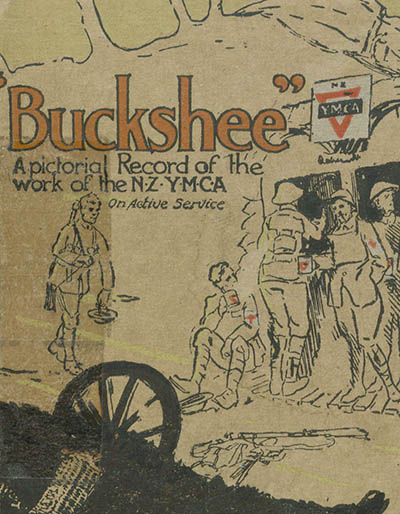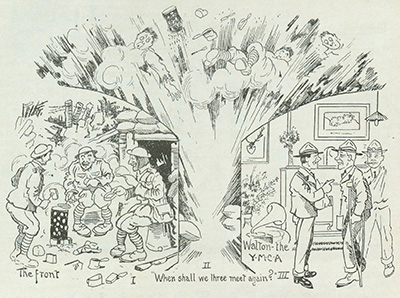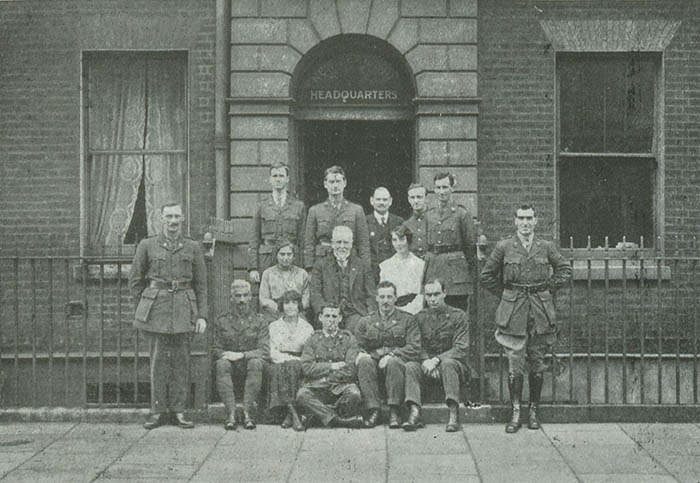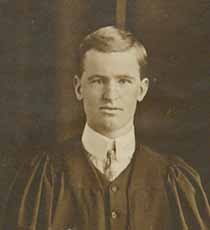
Cover of the YMCA’s Buckshee magazine.NZGC 940.4773 B92. Special Collections, University of Auckland Libraries and Learning Services.

Cartoon from the 11 May 1918 issue of Buckshee magazine.NZGC 940.4773 B92. Special Collections, University of Auckland Libraries and Learning Services.
YMCA years
 The YMCA London staff outside their headquarters in Gower Street.Buckshee Magazine, 18, 1918. NZGC 940.4773 B92. Special Collections, University of Auckland Libraries and Learning Services.
The YMCA London staff outside their headquarters in Gower Street.Buckshee Magazine, 18, 1918. NZGC 940.4773 B92. Special Collections, University of Auckland Libraries and Learning Services.
In June 1916, Macky was licensed as a minister of the Presbyterian Church and left with the 14th Reinforcements to join the YMCA in England. He remained there until late October 1919.
On the front lines, the YMCA ‘buckshees’ were a highly valued source of tea, cocoa, chocolate, biscuits, cigarettes, and letter writing materials for soldiers. In his diary, fellow Auckland University College (AUC) student Vieira Currie made appreciative mention of the hot tea available at the YMCA ‘buckshee’ canteens during the interminable periods of transit that were part of his military experience. In England, where Macky was based, the YMCA was a source of affordable accommodation for soldiers on leave, and information and activities were made plentifully available to gently steer young men away from the temptations of London streets. Although away from the danger of the front lines, he was injured in a car accident in August 1917.
The New Zealand YMCA was headquartered at 15 Gower Street, London. Alongside its presence on troopships, in training camps, and on the front lines, the YMCA also provided extensive facilities for troops on leave and in hospital in London.
The flagship facility of the NZYMCA was Shakespeare Hut, close to the headquarters in Bloomsbury, where any soldier could secure a bed for 9d and meals at less than half the prices charged in London restaurants. The NZYMCA boasted that the hut was ‘home in every sense of the word’. The canteen there could accommodate around 200 men, and they were attended to by ‘lady workers in their crushed-strawberry coloured frocks, which help[ed] to make the hut bright and attractive’.
Macky was especially active in the Brotherhood of Men of Goodwill, a group founded within the YMCA that proselytised in a more overt fashion once the ‘supply of material comforts’ had opened the way for a ‘more direct religious message’. The Brotherhood included New Zealand pacifists such as John Johnson, who were frustrated by the war and its waste of their time and abilities. They held regular bible classes and debates, and actively sought to enlist servicemen. One such debate held during 1918 addressed whether New Zealanders should marry English girls during the war, and reached the decision that they should not.
Macky would lecture on theology at Brotherhood meetings. At one meeting in 1918 they managed to acquire a Social Hall on the banks of the Thames River for a weekend, and spent their days rowing ‘up or down the Thames till signs of fatigue came’, before stopping to ‘talk for an hour or so on the chosen subject’. Through ‘assembling groups of men for Bible study and consideration of the great social and moral questions of the day’ the Brotherhood hoped to attract men who ‘were strongly in favour of “the betterment of things” generally’ to the church.






